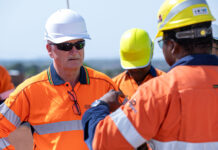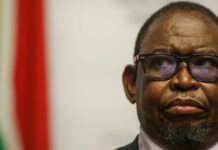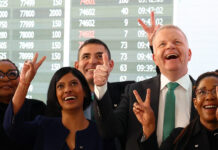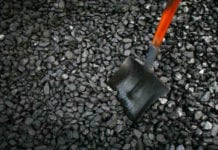
THUNGELA Resources level-pegged on coal export volumes for the six months to end-June but earnings were clobbered by lower export prices which dropped 11% for South African exports and 10% for the group’s Australian exports.
Despite this setback outgoing CEO July Ndlovu – who is retiring and will be replaced by CEO designate Moses Madondo – remains positive over coal’s longer-term future although he cautions prices may remain under pressure in the short-term.
Thungela increased SA saleable production 4% to 6.44Mt (six months to end-June 2024 – 6.17Mt) but export saleable production from the Ensham mine in Australia dropped 16% to 1.57Mt (1.88Mt).
As a result, total revenue dipped 12% to R14.8bn (R16.7bn) but profits plunged 79% to R248m (R1.2bn).
Ndlovu has maintained Thungela’s guidance for full-year export saleable production from South Africa at between 12.8Mt to 13.6Mt and FOB (free on board) cost per export ton at between R1,210 to R1,290.
He noted the improved railage performance from Transnet Freight Rail (TFR) which achieved an annualised rate of 54.3Mt for the first half of 2025 compared with 51,9Mt for the comparable period of 2024.
Ndlovu said the export coal market had been significantly disrupted by geopolitical tensions and rising tariffs which had driven an increase in domestic production in “key demand countries” such as China and India which were concerned about their energy security.
Against this he said production had dropped from a number of coal exporting countries such as Indonesia and Colombia because of the lower coal prices and Australia because of mine accidents and adverse weather in the first half of the year.
Ndlovu said the United States tariff issue indirectly affected South African coal exports because the country’s coal was used in the production of steel in countries like India and China which was directly affected by US tariffs.
He added these countries were also concerned about energy security because they feared a repeat of the market conditions following the outbreak of the war in Ukraine which temporarily drove sea-borne coal prices to sky-high levels above $300/t
Ndlovu commented that, “looking ahead, the long-term coal fundamentals remain supportive although demand for the balance of the year remains contingent on the normal restocking activities in the Northern Hemisphere.
“The slow down in global economic growth may result in coal prices remaining under pressure in the short term. In this scenario further production curtailment is likely to aid rebalancing of supply and demand in the seaborne market.”
Thungela has declared a R2 per share dividend but also bought back shares equivalent to a further R1 a share.
Asked why the group had not simply declared a R3 dividend Ndlovu replied the group saw considerable intrinsic value and upside in its shares and pointed out that foreign shareholders – particularly US investors – preferred returns through share buybacks unlike SA investors who traditionally preferred dividend payments.











